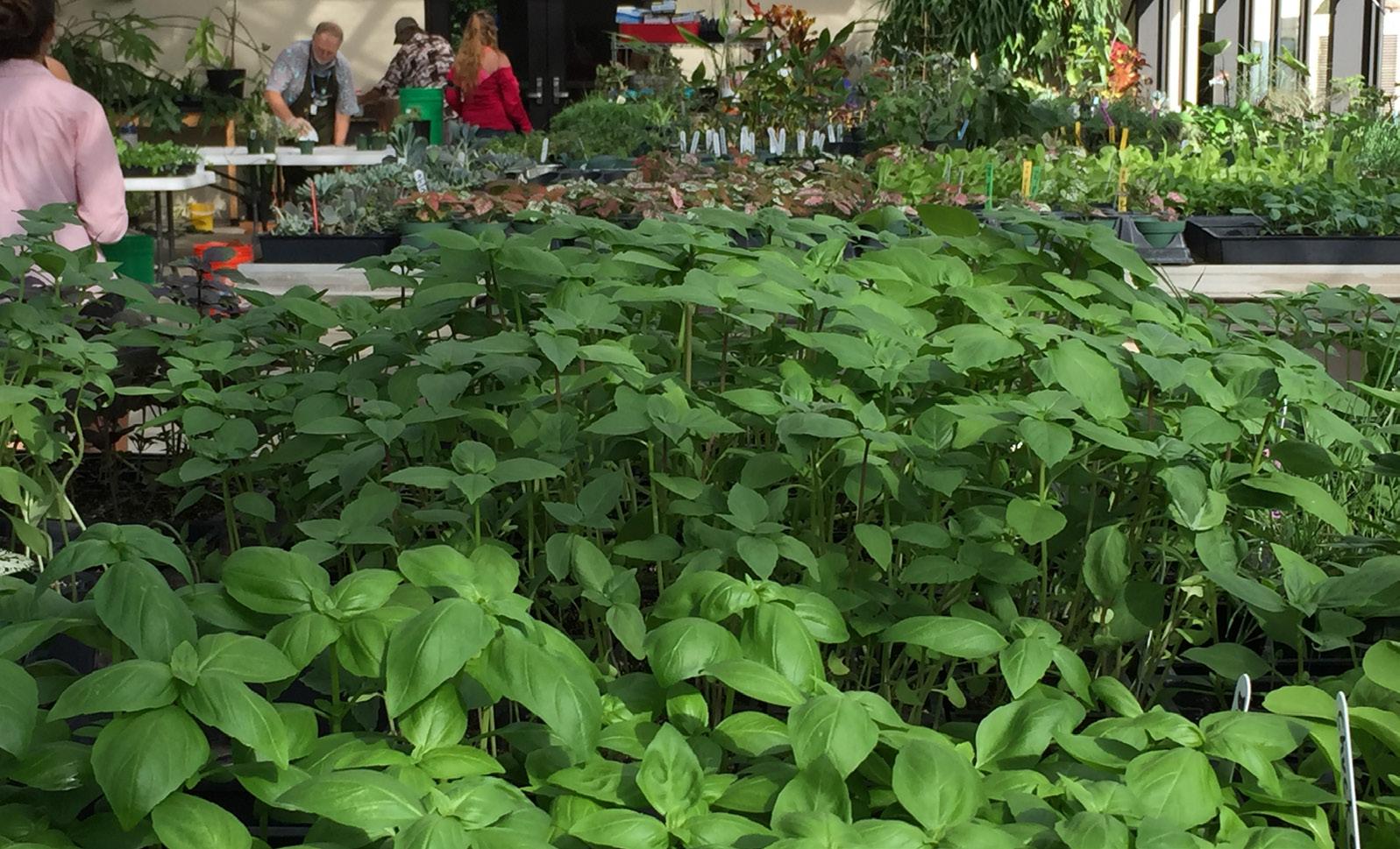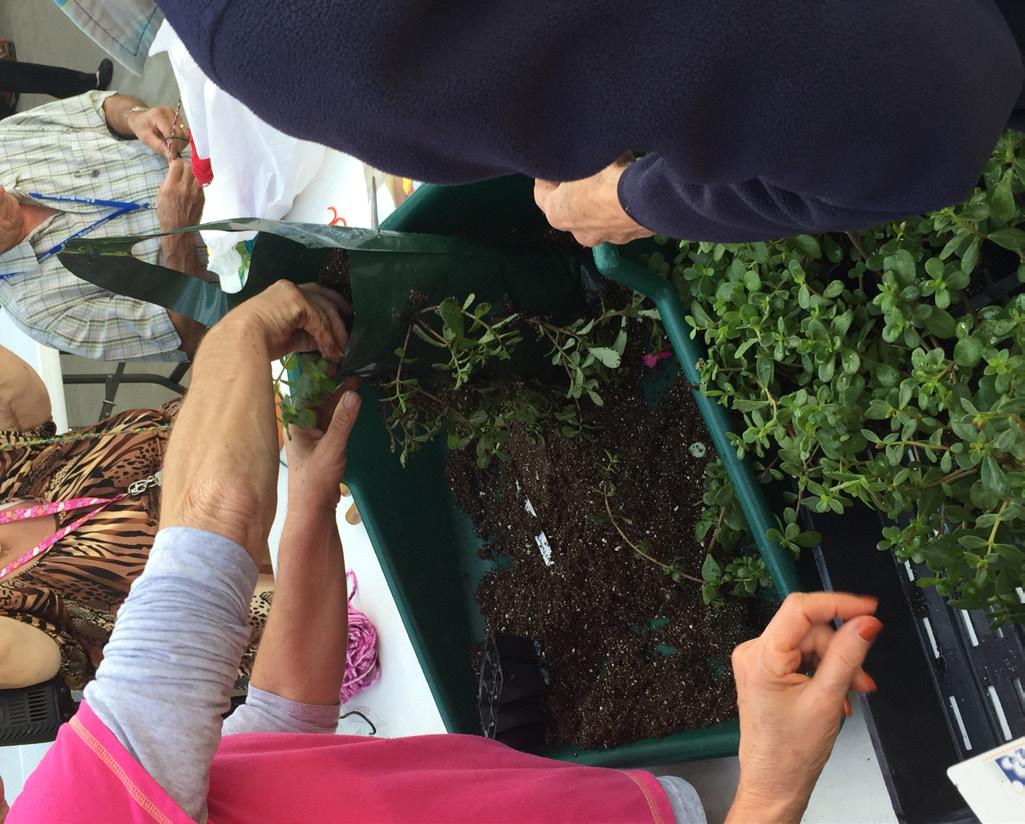
4 minute read
SPECIAL NEEDS GARDENERS Reap Therapeutic Horticulture Benefits
from Natural Awakenings: Alachua, Citrus, Marion, Sumter Co & The Villages, Florida
by Natural Awakenings - Alachua, Citrus, Marion, Sumter Co & The Villages, Florida
by Nancy DeVault
Horticulturists at Wilmot Botanical Gardens, in conjunction with The University of Florida (UF) College of Medicine, are proving that greenhouses can fight the blues and build self-worth. Research shows gardening decreases stress and depression symptoms, and also boosts balance, coordination, muscle strength, motor skills, mental clarity and a sense of accomplishment.
Advertisement
The terms horticultural therapy and therapeutic horticulture are often used interchangeably, but UF Director of Therapeutic Horticulture Leah Diehl clarifies that the approaches are slightly different. While both employ stimulating, plantbased activities, horticultural therapy, as defined by American Horticulture Therapy Association (AHTA), is typically a prescribed treatment facilitated by a registered horticultural therapist that tracks individualized goals and achievements; whereas therapeutic horticulture, like at Wilmot Botanical Gardens, is implemented with less stringent, group-based objectives.
The therapeutic horticulture program began serving veterans in 2012 and grew to include other populations with special needs such as addiction, autism spectrum disorder (ASD), bipolar disorder, cancer, developmental delays, depression, movement disorders, renal disease, spinal cord injury and stroke, in addition to affiliated caregivers. Thanks to the diverse benefits of gardening, participants of varying abilities may cultivate physical, emotional and spiritual gains. Groups comprised of two to 15 people meet for one-hour sessions on a weekly basis. Programs feature three components: traditional horticulture deeds (planting), crafts using plant materials and sensory stimulation (citrus tastings). Private funding and grants typically determine specific special needs emphases. The therapeutic horticulture program is currently facilitating a cancer support group, an addiction group, two veterans groups (one exclusive to women), an alumni assembly open to all former participants regardless of special needs and a horticulture tutoring program for individuals with ASD. While precise instruction and application differs for each group, all have a common theme of connecting with plants and nature to enhance quality of life.
“I have overarching goals for any group that I work with that I think are important and at the core of horticulture therapy. One is that we’re helping individuals rebuild their self-esteem,” says Diehl. “I have found that some of the people that we work with, because of their disease or disability, [feel they] have lost the opportunity to contribute in some way.” She explains that the program affords purpose and creates valuable outcomes both within the participant and inside the greenhouse.
Diehl also strives to foster a sense of community. “Many of them have been isolated because of their diseases or disabilities and they may not have social interaction [elsewhere],” she says. “We’re helping them feel they belong.” Plus, she empowers
participants with a sense of ownership, something that especially resonates with partakers battling addiction.
“Leah gives them a few different options on what they can do which is nice because, usually, our program [treating people with addiction] is regimented,” says Katie Walker, a recreational therapist at the UF Health Florida Recovery Center, of her recovery-oriented patients. Since 2016, the center has taught patients that horticulture can serve as a positive coping mechanism and sober leisure activity. “Because we are a production-oriented greenhouse, the participants feel needed; and since something new is always growing, we decide together what to work on,” says Diehl, who has an affinity for experimenting with unusual plants like the desert rose to deepen engagement.
Walker says the effects of being in the serene setting are fast-acting. “It’s exciting to see from pre-session to post-session how much brighter and more positive the patients are,” she shares. Hoping to stretch that optimism beyond the garden space, patients get to make and take home succulent arrangements. “It teaches them to care for the plant just like they should care for themselves,” Walker explains about the behavior lesson.

While the addiction group hones in on healthy hobbies, young adults with ASD dig into life skills and workplace potential. “Aside from the plant work, we focus on both hard and soft job skills like problemsolving, communicating with co-workers and workplace attire and hygiene,” Diehl says. For the past three years, Dr. Charlie Guy, professor emeritus in the UF Department of Environmental Horticulture, has led the Autism Spectrum Disorder Job Skills training program with a goal to teach students about horticulture and prepare them for the Florida Nursery, Growers and Landscape Association (FNGLA) Certified Horticulture Professional designation exam. “It provides a professional credential that demonstrates a level of horticulture knowledge in general and aspects specific to the state of Florida,” says Guy. “It’s a pathway to gainful employment and a more independent lifestyle.” Although the program is not college credited, Guys says the challenging syllabus is equivalent to that of two school semesters. Students are charged with learning to identify 198 plants among other requirements.
“Of the five students that have gone on to take the exam, all have successfully passed to earn a certificate,” Guy reports. “Three have gone on to obtain jobs in the horticulture industry!” He’s currently assisting two more students interested in earning the FNGLA certificate.
Many other benefits are available through the therapeutic horticulture sessions, such as intellectual stimulation, improved confidence and respite and relaxation. “When working with someone with Parkinson’s disease, for example, you’re working to maintain their physical function and design activities for that [goal],” Diehl explains. She notes that participants combating cancer gravitate toward plant crafts as a form of creative expression, and patients battling addiction mostly crave the calming tasks within the greenhouse.
Wilmot Botanical Gardens welcomes volunteers interested in maintaining the garden and supporting the participants. For those interested in studying therapeutic horticulture, the UF Department of Environmental Horticulture offers an undergraduate certificate in horticultural therapy. Open to UF students as well as non-degree-seeking pupils, this threecourse curriculum is online only and accredited by AHTA.
Wilmot Botanical Gardens is located at 2023 Mowry Rd., in Gainesville. Visit Wilmot.med.ufl.edu.









